The Professional’s Guide to Exploring and Facilitating Access
From the Association on Higher Education and Disability (AHEAD)
Education professionals and mentors can utilize AHEAD’s 2012 Documentation Guidance to assist in modifying documentation practices for maximizing the wealth of information that can be discovered during conversations with students to respond to their needs.
With the right combination of student experience, fluency, and professional expertise, using this adaptive approach in your mentoring can emphasize the importance of tailored, responsive support in fostering development and inclusivity.
The seven components for utilizing the student conversation as an effective resource include:
- The student’s story
- Initial professional observations
- Environmental barriers, considerations, or fundamental components
- Gaps between what the student requests, details in the environment and what you believe would create access
- Your judgment and assessment
- 3rd party documentation to fill gaps in understanding
- Consults with the Disability Office or academic department

